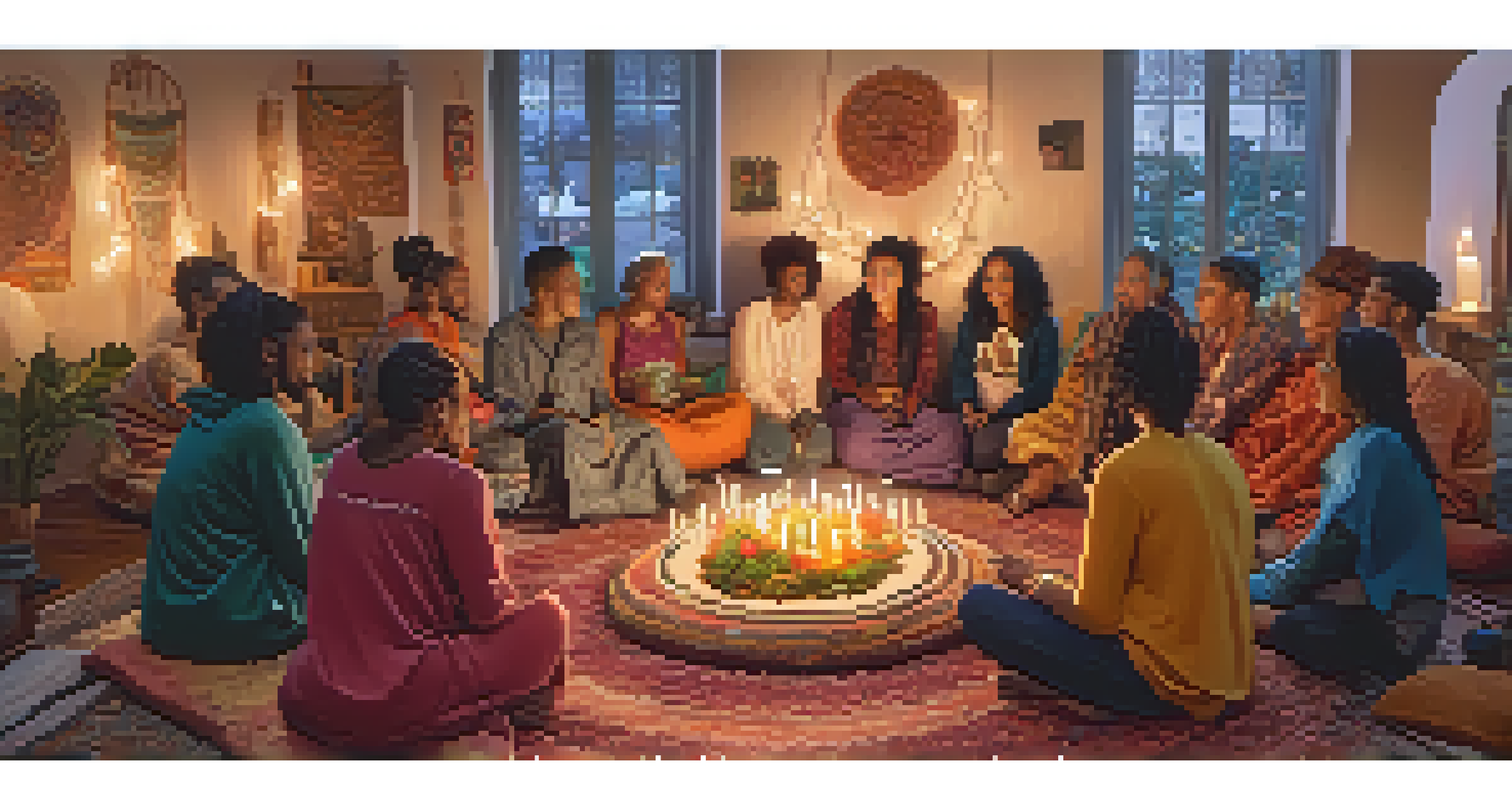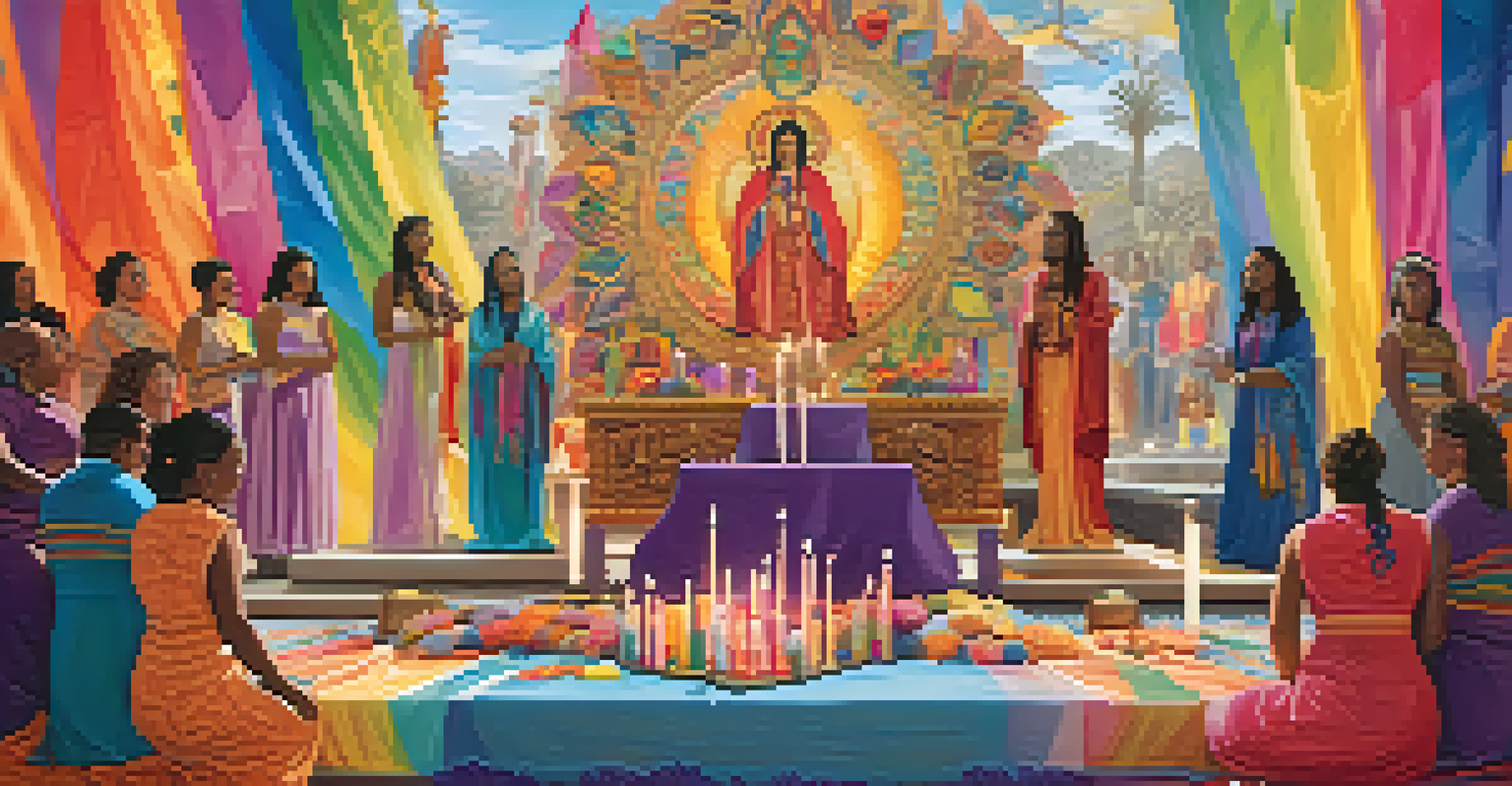Spirituality and Gender Identity: A Complex Relationship

Understanding Spirituality: Beyond Religion
Spirituality often refers to a personal quest for meaning, purpose, and connection. It can encompass rituals, beliefs, and practices that may or may not align with organized religion. This journey is highly individual, allowing each person to define what spirituality means to them, often leading to diverse interpretations and expressions.
Spirituality is not religion. It is a personal journey of self-discovery and connection with the universe.
For many, spirituality serves as a source of comfort and guidance, particularly during times of uncertainty. It can provide a framework for understanding one's place in the universe while fostering a sense of belonging. As individuals explore their spirituality, they may confront questions about identity, including gender.
Thus, spirituality can be a vital aspect of personal identity, shaping how individuals relate to themselves and the world. Recognizing this diversity in spiritual experiences is essential when discussing its connection to gender identity.
Gender Identity: A Personal and Social Construct
Gender identity refers to how individuals perceive themselves and what they call themselves, which may differ from their biological sex. It encompasses a spectrum of identities beyond the binary male and female labels, including non-binary, genderqueer, and more. Understanding gender identity requires recognizing it as a deeply personal experience influenced by societal norms and expectations.

In many cultures, traditional views of gender can create barriers for those whose identities do not conform to the norm. This can lead to feelings of isolation and confusion, making it crucial for individuals to find supportive spaces where they can explore their identities freely. Spirituality can provide such a space, offering acceptance and understanding.
Spirituality is Personal and Diverse
Spirituality allows individuals to define their own meaning and purpose, leading to a wide range of interpretations and practices.
By acknowledging the fluidity of gender identity, we can better appreciate the diverse experiences that contribute to an individual's spiritual journey. This intersection of spirituality and gender identity highlights the need for compassion and openness in our communities.
The Intersection of Spirituality and Gender Identity
The relationship between spirituality and gender identity is complex and multifaceted. For many, spiritual beliefs can either support or challenge their understanding of their gender identity. This dynamic interaction can lead to profound personal growth, as individuals seek to reconcile their spiritual beliefs with their authentic selves.
The only way to make sense out of change is to plunge into it, move with it, and join the dance.
In some spiritual traditions, there is a strong emphasis on gender roles, which can create tension for those whose identities do not align with these expectations. Conversely, many spiritual practices celebrate diversity and encourage individuals to embrace their unique paths. This duality illustrates the importance of nurturing inclusive spiritual communities.
Ultimately, the intersection of spirituality and gender identity invites individuals to explore their inner truths. It encourages a dialogue about how we can create spaces that honor both spiritual beliefs and diverse gender identities.
Spiritual Practices That Embrace Gender Diversity
Many spiritual practices promote inclusivity and acceptance of all gender identities. For instance, certain forms of meditation, yoga, and energy work focus on self-discovery and personal empowerment, making them accessible to everyone. These practices encourage individuals to connect with their inner selves, fostering a supportive environment for exploring gender identity.
Some spiritual communities actively work to dismantle traditional gender binaries, creating spaces where all identities are celebrated. This can include rituals that honor various gender expressions, allowing participants to feel validated and supported. Such inclusivity not only enriches the spiritual experience but also fosters a sense of belonging.
Gender Identity is Multifaceted
Gender identity encompasses a spectrum of experiences and is influenced by personal perception and societal norms.
By incorporating gender diversity into spiritual practices, individuals can find solace and strength in their identities. This affirmation can lead to deeper spiritual insights and a more profound connection to one's self and community.
Challenges Faced at the Intersection of Spirituality and Gender
Despite the potential for growth, individuals at the intersection of spirituality and gender identity often face significant challenges. Discrimination, stigma, and exclusion within spiritual communities can lead to feelings of unworthiness and alienation. This can be especially difficult for those who are seeking spiritual fulfillment while navigating their gender identity.
Many people may feel torn between adhering to traditional spiritual teachings and embracing their authentic selves. This conflict can result in a crisis of faith, where individuals question their beliefs or even distance themselves from spiritual practices altogether. Finding a balance can be an arduous journey, but it's essential for personal well-being.
Addressing these challenges requires open dialogue and a commitment to creating inclusive spaces. By fostering understanding and acceptance, we can help individuals feel safe in expressing both their spirituality and gender identity.
Personal Stories: Spiritual Journeys and Gender Identity
Personal stories can offer profound insights into the relationship between spirituality and gender identity. Many individuals share their journeys of self-discovery, illustrating how their spiritual paths have shaped their understanding of gender. These narratives highlight the struggles and triumphs faced along the way, providing relatable experiences for others.
For example, some individuals recount moments of spiritual awakening that coincided with their coming out experiences. These revelations often lead to a deeper understanding of self and a re-evaluation of spiritual beliefs. Such stories not only inspire others but also emphasize the importance of embracing one's truth.
Inclusive Communities Enhance Growth
Creating inclusive spiritual communities fosters acceptance and supports individuals in exploring both their spirituality and gender identity.
By sharing these journeys, we promote a culture of empathy and understanding. Personal stories serve as powerful reminders of the resilience found at the intersection of spirituality and gender identity.
Creating Inclusive Spiritual Communities for All Identities
Building inclusive spiritual communities is essential for supporting individuals at the intersection of spirituality and gender identity. This means actively working to dismantle barriers that exclude marginalized identities and fostering an environment where all feel welcome. Inclusivity can be achieved through education, open dialogue, and a commitment to understanding diverse experiences.
Spiritual leaders and community members can take steps to create supportive spaces by incorporating diverse voices and perspectives. This may include hosting workshops on gender identity, incorporating inclusive language in rituals, and providing resources for those exploring their spirituality. These efforts can create a sense of belonging and encourage personal growth.

Ultimately, cultivating inclusive spiritual communities enriches everyone's experience. By honoring the diversity of identities, we can create a more vibrant and supportive spiritual landscape for all.